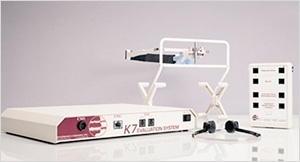A Beginner’s Guide to Neuromuscular Dentistry

A cutting edge diagnosis
Dentists who offer neuromuscular treatment employ a variety of cutting-edge methods to identify the sources of TMJ symptoms and select appropriate solutions.
- With sonography, dentists can accurately measure vibrations that result when TMJ patients move their jaws.
- EMG, or electromyography, enables measurement and recording of muscle activity through electrical signals.
- Jaw movement can be analyzed using jaw tracking, also known as kinesiography, in which patients wear a headset equipped with a magnet that is placed on the lower teeth in the front of the mouth.
- Finally, TENS, or transcranial electrical nerve stimulation, involves the application of low-frequency electrical current to the jaw in order to relax the muscles and develop a clearer picture of the jaw’s optimal position.
Get effective relief with customized treatment
After diagnosing TMJ and identifying the jaw position that is necessary to relieve your symptoms, your dentist creates a custom orthotic device. You’ll wear this orthotic device for three to six months or until symptoms have been eliminated. At this point, your dentist may recommend restorative dental work or orthodontic treatment to ensure that your jaw stays in the proper position and keep you free of TMJ symptoms.
Simply put, neuromuscular dentistry helps get your jaw into its optimal position to relieve the symptoms associated with TMJ. While traditional dentistry focusses primarily your teeth, bones, and gums, neuromuscular dentistry works with the hard tissues, AND your soft tissues, muscles and nerves. Your hard and soft tissues have a complex relationship and to work properly the relationship must be a harmonious one. Dentists practicing neuromuscular dentistry understand the importance of including your power power source (your muscles) and your controls (your nerves) when they consider the overall function of your mouth.
Learn more
TMJ is a complex disorder. Diagnosis and treatment can vary considerably between dentists practicing neuromuscular dentistry. To avoid incorrect diagnosis or ineffective treatment, make sure you select a dentist with training and experience in this field.? To learn more about TMJ and how it may be affecting you, download my free e-book, “Do I Have TMJ?”
